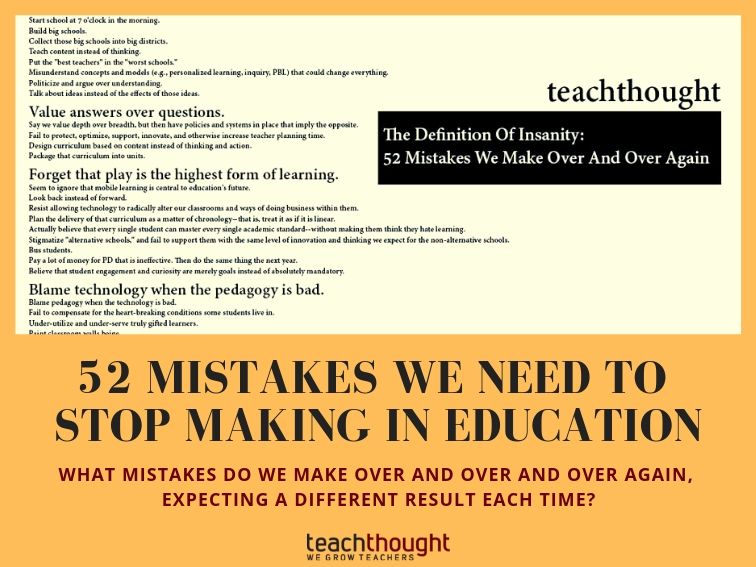
We Need To Stop Making These Mistakes In Education
by Terry Heick
The context for this one is simple enough–what mistakes do we constantly make in education that hold us back from the best versions of ourselves?
From realizing our collective potential as a construct, field, and industry? What mistakes do we make over and over and over again, expecting a different result each time?
Probably a lot, but 52 is enough for now.
- Forget learning should be fun.
- Stigmatize failure.
- Think of children like little adults.
- Gamify compliance to institutional policies instead of social change and disruptive creativity.
- Place students on the periphery when we design, plan, and respond to their learning. (It’s theirs, not ours.)
- Assume all kids need to know the same things.
- Fail to meaningfully involve–or better yet, require–community involvement in every layer of our system of teaching and learning.
- Fail to recruit African American and Latino teachers with forward thinking.
- Plan backwards from standards.
- Start school at 7 o’clock in the morning.
- Build big schools and expect personalization.
- Collect those big schools into big districts and expect innovation.
- Prioritize uniformity and expect creativity.
- Teach content instead of thinking.
- Put the “best teachers” in the “worst schools.”
- Misunderstand concepts and models (e.g., personalized learning, inquiry, PBL) that could change everything.
- Reduce understanding to letters and numbers.
- Talk about ideas instead of the effects of those ideas.
- Value answers over questions.
- Say we value depth over breadth, but then have policies and systems in place that imply the opposite.
- Fail to protect, optimize, support, innovate, and otherwise increase teacher planning time.
- Design curriculum based on content instead of thinking and action.
- Package that curriculum into units.
- Forget that play is the highest form of learning. (We come to understand through play; we can’t “play” with what we don’t understand; we can’t fail to improve our understanding when we play.)
- Seem to ignore that mobile learning is central to education’s future.
- Look back instead of forward.
- Resist allowing technology to radically alter our classrooms and ways of doing business within them.
- Plan the delivery of that curriculum as a matter of chronology–that is, treat it as if it is linear.
- Actually believe that every single student can master every single academic standard–without making them think they hate learning.
- Stigmatize “alternative schools,” and fail to support them with the same level of innovation and thinking we expect for the non-alternative schools.
- Believe that vertical alignment is possible to do consistently.
- Teach reading like a skill instead of a knowledge-seeking, pleasurable activity.
- Bus students.
- Pay a lot of money for PD that is ineffective. Then do the same thing the next year.
- Believe that student engagement and curiosity are merely goals instead of absolutely mandatory.
- Blame technology when the pedagogy is bad.
- Blame pedagogy when the technology is bad.
- Fail to compensate for the heart-breaking conditions some students live in.
- Under-utilize and under-serve truly gifted learners. (Actually, we under-utilize and under-serve the gifts of all learners, but we have downright brilliant students in our schools just eking out an academic existence instead of changing the world.)
- Paint classroom walls beige.
- Make schools look less like museums and more like corporate offices.
- Make classrooms look less like cafes and more like stuffy rooms.
- Confuse rigorous, complex, challenging, and difficult.
- Make good ideas into “programs,” then wonder why teachers roll their eyes at good ideas.
- Separate curriculum, assessment, instruction, and technology.
- Value teacher compliance over teacher capacity.
- Celebrate uniformity and teachers being on the “same page,” but expect great teaching.
- Let teachers talk more than students.
- Dehumanize teachers with pressure, then wonder why they quit.
- Drag students kicking and screaming through lessons and units. (Instead of figuring out another way.)
- Under-value relationships with students (including formal mentoring programs).
- Think of school as “college and career prep.”
The Definition Of Insanity In Education: 52 Mistakes We Make Over And Over Again
